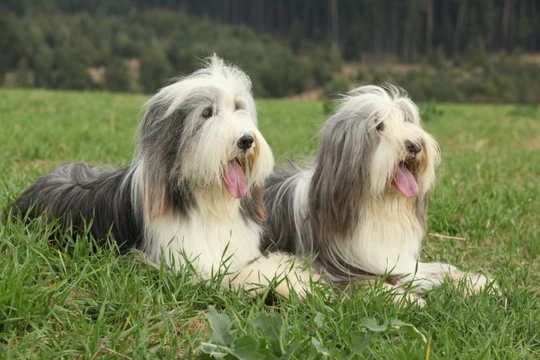
Long-term Health Overview for the Bearded Collie
Long-term breed health depends on many factors which includes responsible breeding practices for any breed including the Bearded Collie. The problem typically revolves around ensuring that inbreeding is kept to a minimum and that the “gene pool” remains large because the health of each individual dog can impact the overall long-term health of a breed like the Bearded Collie.
Organisations that offer in-depth health information
The good news is that today breeders have access to a lot more information via the internet, the Kennel Club, other canine organisations and breed clubs where a dog's lineage can be checked and traced before being mated with another chosen dog. With Bearded Collies, there are a lot of useful articles written by experts who are sponsored to produce valuable information on health issues that affect the breed but other useful links include the following:
The Kennel Club
Offers advice on breeding practices, breeding restrictions, genetics, health, registration statistics, health surveys as well as canine activities for specific breeds. The site also allows breeders and owners to check on health tests carried out on KC registered dogs. This type of search also helps when it comes to predicting the coefficient of Bearded Collies.
The Bearded Collie Club
Offers valuable information on Bearded Collies as well as relevant health issues. The site also provides information on the following:
- Club events
- Shows
The site also offers a page that is dedicated to the Bread Health Co-ordinator with the Kennel Club and it provides valuable information on relevant health surveys.
CIMDA
Offers valuable information on immune mediated disease that's essential for any owners who share a home with a Bearded Collie that suffers from any form of immune mediated disease.
VetCompass
Offers detailed information on all the health data collected through vets who are registered with the site.
Dogs Wellnet
Offers valuable information on international health in Bearded Collies and is a website that has the full support of the Kennel Club.
Irena's Bearded Collie Pedigrees
Offers information on 4 to 6 generation Bearded Collie pedigrees and this includes worldwide. The site also offers information on pedigrees of test matings"". See link here.
BeaCon
BeaCon is based in the US, but offers a lot of information on health issues that affect the Bearded Collie. It not only includes dogs located in the States, but in the UK too.
BCX
Offers essential reading on health issues, research as well as information on judges and forthcoming shows for Bearded Collies.
Organisations that offer health testing for Bearded Collies
When it comes to health testing for Bearded Collies, tests and screening is not only offered through the Kennel Club with other organisations also offering this service for Bearded Collies. This includes the following:
British Veterinary Association
Working alongside the Kennel Club, the BVA offers owners and breeders testing and screening options for the breed. Downloads on specific health issues that are known to affect Bearded Collies can be found on the website.
Animal Health Trust
Offers information on health issues that affect the breed as well as research that is being carried out. The site also offers valuable information about the ""Give a Dog a Genome"" project which many breed clubs have joined and this includes Bearded Collie Clubs in the UK.
Laboklin (UK)
Offers testing for specific health issues that affect the Bearded Collie. Owners and breeders can have their dogs tested for a fee to ensure they are free of any known hereditary and congenital health issues known in the breed.
Organisations that offer access to research papers some of which are freed to download or read online whereas other articles need to be paid for, although the ""abstract"" is free to read online:
- PubMed
- Plos One
- Science Direct
- Canine Genetics and Epidemiology
Although these articles offer valuable information on health issues that affect Bearded Collies, it is still important to check who has carried out the research and who has sponsored the studies and when the article was published.
What about coefficient of inbreeding (COI)?
It would be fair to say that ""harmful"" genes exist in all breeds, but it would be a mistake to assume that this can have a serious impact on a dog's health. The problems start when a Bearded Collie with a known hereditary or congenital health issue is mated to a dog that is also ""high risk"" more especially if the dogs share a common ancestor that's known to have the harmful recessive genes.
The COI of a breed allows for responsible breeding in that owners and breeders can measure the risk that a Bearded Collie has inherited the harmful copies of a gene from both parent dogs which was passed down to offspring via a common ancestor in their ancestry.
Breeders are encouraged to use the Kennel Club's Mate Select Service which allows them to establish the COI of any dog as well as finding out the ""projected"" coefficient of any puppies from a future mating. The Kennel Club also produces a breed average COI every year for all UK registered Bearded Collies that were born between January and December of previous years. The report is published every summer and currently the COI for Bearded Collies stands at 14.8%.
What about Estimated Breeding Values (EBVs) for hip dysplasia
The Kennel Club also provides essential information on hip dysplasia, which is a joint condition that can seriously affect a Beardie. Estimated Breeding Values (EBVs) help breeders make an informed decision when it comes to their breeding stock and goes a long way in reducing the risk of Bearded Collies inheriting this painful and debilitating condition from parent dogs.
""



